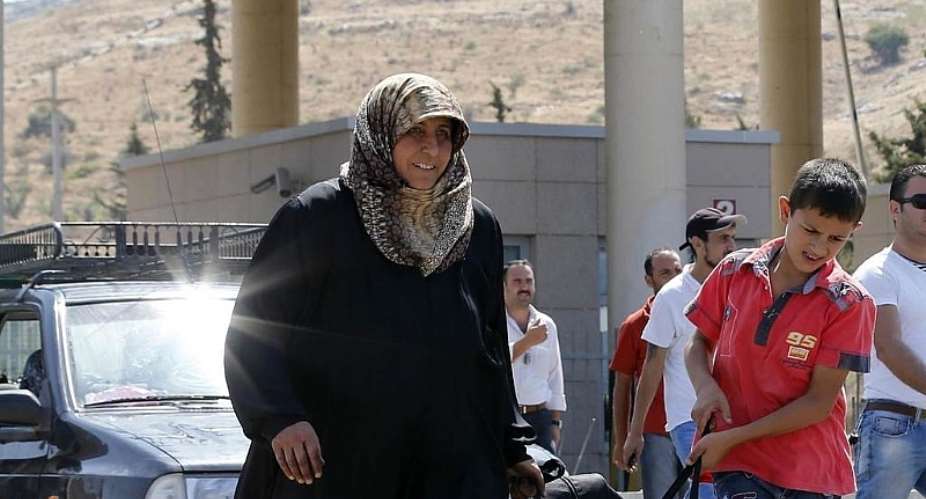The month of March 2021 marked the fifth anniversary of a refugee deal between Turkey and the European Union. The agreement saw Ankara agree to stem a mass exodus of refugees and migrants to Europe in exchange for monetary aid. But the future of that controversial agreement is now in question.
Turkish coast guards regularly intercept boats full of refugees and migrants making the short but often perilous trip from Turkey across the Aegean Sea to EU member Greece.
Under an agreement with the European Union, Turkey has become Europe's gatekeeper in exchange for billions of euros to help host Syrian refugees. The number of people seeking to enter Greece from Turkey has fallen from 856,000 in 2015 to just 10,000 in 2020, according to Turkish government figures.
With Turkey's EU membership bid frozen, the refugee deal is one of the last remaining ties Ankara has with the European bloc.
"The refugee deal has become an important component of the EU/Turkey relationship, because many important channels have become dysfunctional," said Sinan Ulgen of the Istanbul-based Centre for Economics & Foreign Policy Studies.
"When we look at the overall framework of the Turkey/EU relationship, it was underpinned by the accession track, but that has stalled over the past few years. The refugee deal is the only area where we see real and positive momentum in the Turkey/EU relationship, and that is why it remains a critical component of this relationship today," added Ulgen.
Refugees caught in a power struggle
But the deal is under strain, with the refugees caught in the middle. Social media platforms are awash with videos of Greek coast guards appearing to push flimsy boats packed full of migrants back towards Turkish waters
Ankara, backed by rights groups, accuses Athens of pursuing a deliberate and illegal policy of forcibly returning refugees to Turkey, a charge which Greece denies.
Last year, Turkey temporarily opened its Greek border to migrants after accusing the EU of reneging on the deal. This resulted in weeks of clashes between migrants and Greek security forces.
Ankara is now calling for the refugee agreement to be revised. "Turkey has not been happy with the deal since the beginning because the European Union has not fulfilled its promises, claimed Huseyin Bagci, Director of the Turkish Foreign Policy Institute.
"The European Union doesn't trust the Turkish government concerning the transfer of cash," added Bagci. "They, naturally, want to control whether the projects are realised or not. So from this perspective, it will be difficult."
Who funds refugee education and health?
Turkish schools have opened their doors to millions of Syrian children. Ankara is pressing for greater control over EU funds to cover costs like providing Syrians with education and health services.
Turkey puts a price tag of over 20 billion euros for hosting the nearly four million Syrian refugees. Ankara also says a promise of visa-free travel for Turkish citizens hasn't been honoured by the EU. But Ankara is aware the refugee deal provides important diplomatic protection.
"It's the biggest leverage Turkey has," said Sezin Oney, columnist for Turkey's Duvar News Portal.
"For example, human rights issues, or economic related issues, these kinds of pressures that Turkey might face in the form of sanctions are in a way taken hostage because of the refugee issue. So then the European countries lack pressure or any kind of leverage they might have over Ankara," added Oney.
Turkey's increasing crackdown on dissent has seen critics accuse the EU of failing to take a tough stance against Ankara over its deteriorating human rights record.
Refugees are now a domestic political problem
But with recent opinion polls indicating growing public resentment in Turkey to Syrian refugees, the Turkish government could yet pay a heavy political price for the refugee deal.
"There are a lot of discussions concerning the migrants and refugees. The issue here is how long can Turkey cope with this problem alone?" said Bagci. "The political parties in the next election will definitely use the Syrian migrants, or migrants in general, refugees in general as a big domestic political issue."
The nearly four million Syrian refugees in Turkey, who have little prospect of returning home or moving on to Europe, appear destined to continue to remain pawns in the region's intricate political calculations.





 We’ll protect state wealth from opaque deals – Prof Jane Naana
We’ll protect state wealth from opaque deals – Prof Jane Naana
 Mauritania president says running for second term in June polls
Mauritania president says running for second term in June polls
 I won't ever say I was a mere driver’s mate' — Prof. Opoku-Agyemang
I won't ever say I was a mere driver’s mate' — Prof. Opoku-Agyemang
 2024 polls: 'EC struggling to defend credibility'— Prof. Opoku-Agyemang
2024 polls: 'EC struggling to defend credibility'— Prof. Opoku-Agyemang
 Akufo-Addo gov't's 'greed, unbridled arrogance, unrestrained impunity, sheer dis...
Akufo-Addo gov't's 'greed, unbridled arrogance, unrestrained impunity, sheer dis...
 Election 2024: Ghana needs an urgent reset, a leadership that is inspiring – Ma...
Election 2024: Ghana needs an urgent reset, a leadership that is inspiring – Ma...
 Partner NDC to rollout a future of limitless prospects – Prof Jane Naana Opoku-A...
Partner NDC to rollout a future of limitless prospects – Prof Jane Naana Opoku-A...
 NPP will remain in gov’t till Jesus comes — Diana Asamoah
NPP will remain in gov’t till Jesus comes — Diana Asamoah
 Sunyani Technical University demands apology from former SRC president over sex-...
Sunyani Technical University demands apology from former SRC president over sex-...
 'Dumsor' was resolved by Mahama but ‘incompetent' Akufo-Addo has destroyed the g...
'Dumsor' was resolved by Mahama but ‘incompetent' Akufo-Addo has destroyed the g...
